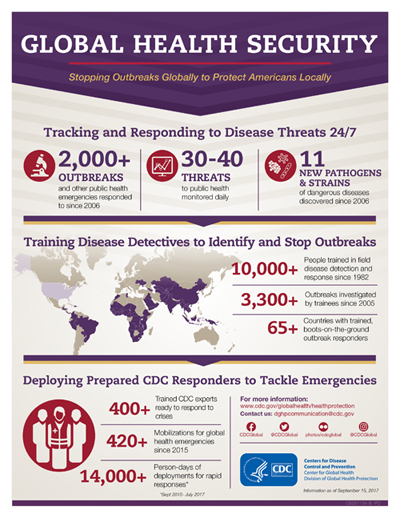Why Global Health Security Is Essential to U.S. National Security
Press Release
Embargoed Until: Thursday, September 21, 2017, 1:00 p.m. ET
Contact: Media Relations
(404) 639-3286
How does CDC fulfill its mission to keep America safe from health threats? The first-ever special supplement to CDC’s Emerging Infectious Diseases (EID) journal details progress made in preventing, detecting, and responding to disease threats around the world.
The threats keep coming: SARS in 2003; pandemic influenza in 2009; the largest Ebola outbreak in history in 2014; Zika in 2015. Since then we’ve had regional outbreaks of chikungunya, yellow fever, and H7N9 influenza, among hundreds of others. And we’ve seen the global emergence of multidrug resistant superbugs in just the past few years.
Today, EID releases the first article in the supplement, “U.S. Centers for Disease Control and Prevention and its Partners’ Contributions to Advance Global Health Security,” which highlights selected accomplishments of CDC and partners to protect Americans and the global community by supporting containment of health threats at their source.
“In less than 36 hours, an outbreak that begins in a remote village can reach major cities on any continent and become a global crisis,” said Jordan W. Tappero, M.D., M.P.H., senior advisor to CDC’s Center for Global Health and lead author of the article. “Even outbreaks that don’t cross national boundaries can have an economic impact on the U.S.”
CDC strengthens global health security, protects Americans, and saves lives
CDC responds to and reduces the impact of global health threats by:
- Partnering with 31 countries and the Caribbean community to meet the goals of the Global Health Security Agenda.
- Advancing Field Epidemiology Training Programs, modeled after CDC’s two-year Epidemic Intelligence Service program, in 65 countries, graduating more than 3,800 advanced field epidemiologists who conducted more than 3,300 outbreak investigations from 2005-2016.
- Managing a CDC Global Disease Detection Operations Center that monitors 30-40 public health threats in more than 190 countries daily.
- Establishing a CDC Global Rapid Response Team (GRRT) of more than 400 experts – ready to deploy in as little as 48 hours – that has mobilized more than 420 times since September 2015.
- Establishing Global Disease Detection Centers around the world. From 2006 – 2016, these centers have responded to more than 2,000 requests for assistance with disease outbreaks and established more than 380 new diagnostic tests in national or local laboratories in 59 countries.
“Infectious diseases are not going away,” emphasized Dr. Tappero. “If we do not sustain global health security efforts, the obvious implication is that people get sick and die. The human toll can be more or less, depending on how prepared the world is.” Less obvious, he notes that “the impact of global outbreaks ripples far beyond the individual – to families, healthcare systems, communities, and whole economies that can become destabilized – and recovery can take years, with setbacks felt for generations.”
Global health security is good business for the United States
Outbreaks, regional epidemics, and pandemics are costly. For example, during February to July 2003, an epidemic of Severe Acute Respiratory Syndrome (SARS) rapidly spread across four continents, infected 8,100 people, and cost the global economy $40 billion.
Just as disease outbreaks cost lives, they can also disrupt global travel and trade and threaten economic stability. The U.S. is a major exporter — in 2015, the U.S. exported over $300 billion in American-made material goods and services to 49 CDC health security priority countries. These same exports supported over 1.6 million U.S. jobs across all 50 states.
“Prioritizing a sustained, focused commitment to global health security is vital to saving lives and minimizing political and economic instability around the world,” said Rebecca Martin, M.D., director of CDC’s Center for Global Health and co-author of the article.
About Emerging Infectious Diseases (EID) and the Global Health Security Supplement
EID is a peer-reviewed journal established to promote the recognition of new and reemerging infectious diseases around the world. The special supplement on global health security will include more than 30 articles with details and examples of how CDC is advancing global health security in collaboration with Ministries of Health, the World Health Organization, U.S. governmental agencies, and external partners.
Articles in the supplement demonstrate how CDC’s global health security work has strengthened public health response capabilities, particularly in the areas of surveillance, laboratory, workforce, emergency management and response, and timely evaluation and research.

